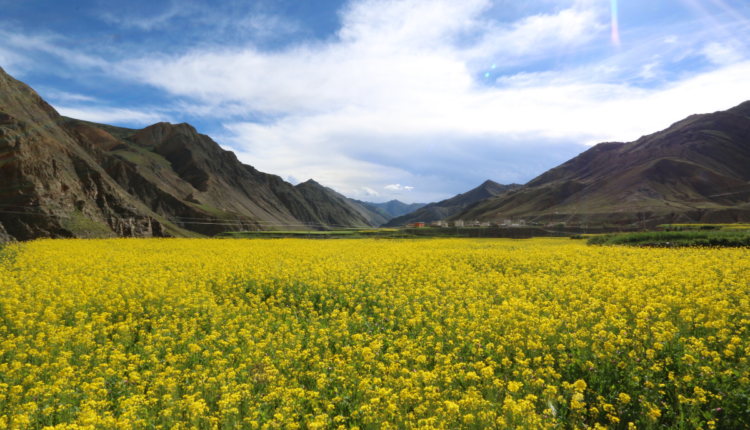Inspiring story of Mahesh B Solanki, who became a symbol of self-reliance and innovation in organic farming
Mahesh B. Solanki is a combative and dedicated farmer from Kasganj district of Uttar Pradesh. With his deep understanding and technical acumen in the field of organic and natural farming, he has not only increased the fertility of his farm but has also succeeded in increasing his income. Solanki’s use of new technology in agriculture and his long-term plan for traditional farming has become a source of inspiration in his area.
Model of natural farming and self-reliance
Mahesh’s model of organic farming is a unique example in which he does not depend on any external resources. He has about 20-25 indigenous cows, whose dung and cow urine he uses in the manufacture of fertilizers, pesticides and nutrients. Solanki says that in organic farming, if fertilizers and other essential substances are made from the material available in the field instead of using external chemical fertilizers and pesticides, then the quality and nutrition of the produce improves. All the necessary ingredients are produced on his farm and he does not use any type of chemical products in his farm.
Efficient use of new technologies
Mahesh has also used many types of modern technologies to bring innovation in organic farming. He has large tanks for the production of Jeevamrit, Beejmrit and other nutrients, which are mixed with automatic motors. This not only saves time but also makes the mixture uniform. By using these mixtures, he increases the quality of the product in his farms and its specialty is that it does not have any adverse effect on the environment.
Challenging beginning and benefits of innovation
This journey of Mahesh has been full of challenges. Dealing with pests and weeds is a big problem in organic farming. For this, he resorted to organic techniques and gave priority to pest control with the use of natural herbs. He says that this method is not only helpful in saving biodiversity but through this he is successful in maintaining the nutrition of his products. These measures ensure that their crops are of unmatched quality and sell at a higher price in the local markets.
Guidance and inspiration for local farmers
Mahesh Solanki not only uses new techniques on his farm, but he also shares his experiences with other farmers. He teaches the farmers who visit his farm the complete methods of organic farming, so that other farmers can also adopt environmentally friendly farming. Farmers who visit his farm not only get practical knowledge of organic farming but also get an experimental and inspiring example.
Future of organic farming and Mahesh’s contribution
Mahesh B. Solanki believes that the future of organic farming is bright, especially when new techniques are used in agriculture. Low cost and high profit in organic farming improves the income of farmers and also helps them to become self-reliant. Mahesh’s contribution and his dedication is strengthening organic farming in his area, which will prove to be a milestone for environmental protection and a new direction of agriculture in the coming times.
This work of Mahesh is not limited to his fields only, but it has become a source of inspiration in the society. He believes that natural farming is the only way which can not only improve the economic condition of the farmers, but can also provide healthy and pure food to the society.
If other farmers like Mahesh also want to move towards organic farming, then they can make a successful start by keeping in mind some important things. Organic farming is a natural method, in which chemical fertilizers and pesticides are not used. Instead, the fertility of the land is maintained by using the natural resources available in the field. To start organic farming, it is important to pay attention to the following things:
1. Soil preparation and use of organic fertilizer:
• Organic farming starts with soil testing. Organic fertilizer should be used to maintain the fertility of the soil. For this, natural fertilizers like cow dung manure, vermicompost, Jeevamrit, and Beejmrit can be used.
• Farmers like Mahesh prepare Jeevamrit and Beejamrit from the cow dung and cow urine available in their farm, which maintains the quality of the soil along with providing essential nutrients to the plants.
2. Seed quality and use of indigenous seeds:
• High quality indigenous seeds should be used in organic farming, as these seeds have greater capacity for environmental adaptation.
• Local Krishi Kendras or organic seed distribution programs can be contacted for the availability of organic seeds. Plants from indigenous seeds are more healthy and pest resistant.
3. Natural pesticides and weed control:
• Use natural pesticides instead of chemical pesticides. Neem oil, cow urine, garlic-ginger mixture and Tridoshak Khatai can be used for pest control in crops.
- For weed control, organic mulching, weeding, and planting of plants at proper distance during sowing can be done. It promotes plant growth as well as controls weeds.
4. Water harvesting and irrigation:
• To conserve water, it is important to arrange for rainwater harvesting in the field, so that the crops can get water in times of drought.
• The use of modern irrigation techniques like drip irrigation and sprinkler helps in preventing wastage of water and this helps the crops get adequate water.
5. Benefits of government schemes:
• To promote organic farming, the central and state governments run many types of schemes, such as Organic Farming Scheme, Pradhan Mantri Kisan Samman Nidhi Yojana, and Vermi Compost Unit Grant Scheme.
• To take advantage of these schemes, contact the local agriculture officer and get information from agriculture centers.
6. Community support and training:
• Experience is important in organic farming, so work together with experienced farmers or participate in training programs organized by Krishi Vigyan Kendras.
• Contacting farmers like Mahesh and taking guidance from them can be a good step. Taking inspiration from successful organic farmers like him, other farmers can easily adopt this technique in their farms.
Organic farming is not only environment friendly but its products are also better for health. Apart from this, it improves the income of farmers and they move towards a sustainable and self-reliant farming. Organic farming requires less investment, and if done correctly, the profits can be high.
Contact us- If farmers want to share any valuable information or experiences related to farming, they can connect with us via phone or whatsApp at 9599273766 or you can write to us at [email protected]. Through Kisan of India, we will convey your message to the people, because we believe that if the farmers are advanced then the country is happy.



